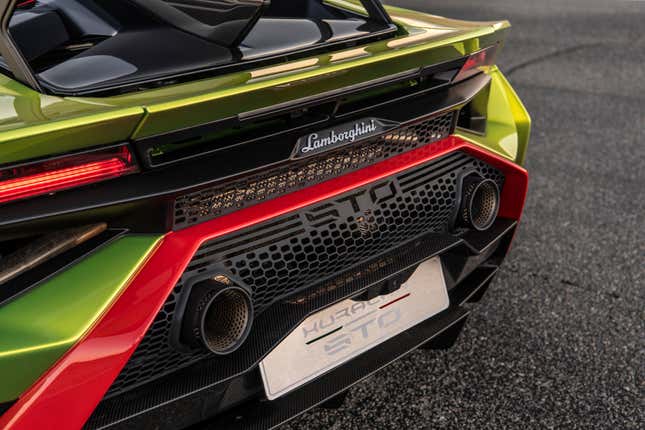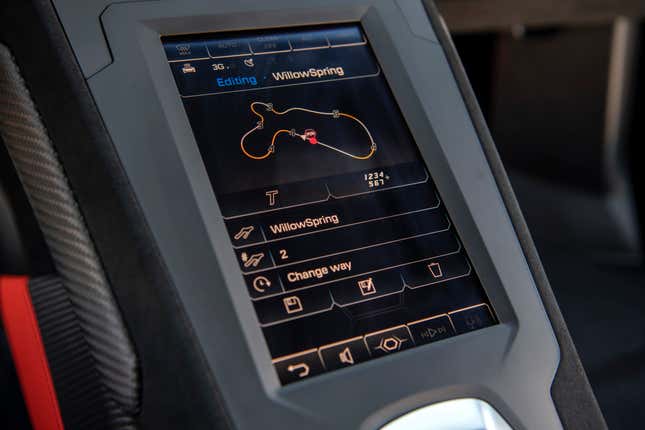One of the world’s biggest travesties is that most supercars spend the majority of their entire lives in captivity. Ferraris snoozing in heated garages. McLarens parked on Rodeo Drive. And Lamborghinis? Imagine a cavalcade of them bumper-to-bumper along A1A, slowly inching forward. If these cars are very, very lucky, some of them will achieve redline in a gear other than first.
While no modern supercar should ever suffer this indignity, confining the Lamborghini Huracán STO in a similar fashion should be a punishable crime. So raw and feral, yet utterly, brilliantly capable, it goes without saying that the STO should never be found in any of these situations. It deserves to spend every second of its existence on a racetrack. Thankfully, that’s exactly where I got to sample Lamborghini’s latest monster.
Full disclosure: Lamborghini invited me to Willow Springs Raceway, where they provided me with a free helmet and small sandwiches with the crusts cut off.
Much closer in spirit to the GT3 Evo and Super Trofeo race cars than anything else in the Huracán lineup, the STO was designed from the start to be barely—just barely—road-legal. And it’s meant to represent the ultimate expression of what this model can achieve on the street.
“Is this the pinnacle of performance? Yes,” says Lamborghini Chief Technology officer Maurizio Reggiani. “More is difficult to imagine, because aero is at the top. Braking is at the top. The management of the engine is at the top.”
It’s hard to believe that’s possible, considering the Huracán Performante crushed the Nürburgring record for a production car back in 2016. Reggiani explains that “the Performante was full of technology, active aerodynamics, really highly sophisticated.”
But the main difference between the philosophy of the STO and Performante comes down to how that performance is defined. If the Performante’s mission was outright speed, the STO is built for endurance.
In endurance racing, the less stuff that can break, the better. It’s clear that Lamborghini has figured out this formula, given that the GT3 Evo clinched back-to-back victories at the 12 Hours of Sebring and a three-year run at the 24 Hours of Daytona. Following that lead, the STO receives a manually adjustable rear wing in place of the Performante’s active aero setup. Rear-wheel drive reduces weight and complexity. And speaking of weight, the STO is 95 pounds lighter than the Performante, thanks to a lighter windshield, magnesium wheels, and the extensive use of carbon fiber in over 75 percent of the exterior panels.
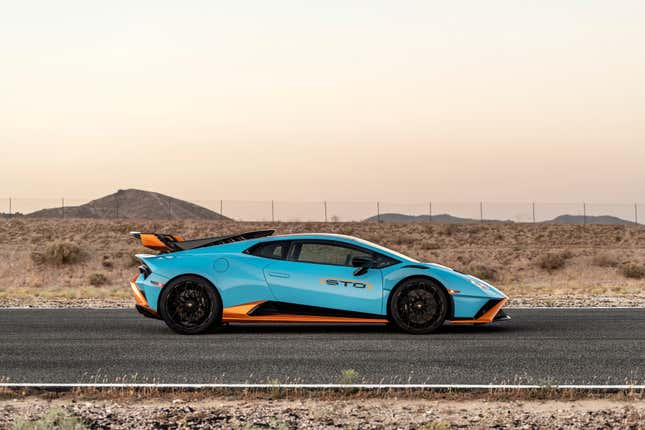
And let’s talk about that exterior. Not that the rest of the Huracán lineup is subtle, but the extremely low profile infers a sense of stealth. The STO has no patience for such subtlety. The massive wing not only dominates the rear end, but it looks sharp enough to julienne unsuspecting birds who happen to fly too closely.
Within this menace lies pure function: all of the visual changes are designed to take full advantage of the surrounding atmosphere at speed. An integrated scoop atop the roof sucks in air and shoves it straight into the engine compartment to aid in cooling. Flowing off the back of the scoop is a shark fin-shaped blade which helps to stabilize the air before it reaches the wing, improving its cornering efficiency.
And though the face retains the familial Huracán cues, the visage is unique to the STO. The hood, fenders, and front bumper are a single unit. Giant ducts atop the hood perform double duty, cooling the engine while also improving downforce. Larger front brake cooling ducts flow past the brakes and extract the hot air through louvered vents atop the fenders. Lamborghini says the official name of the front end is “cofango,” which is a mashup of the Italian words “cofano” (hood) and “parafango” (fender), but I think I’ll just call it “Fang.”
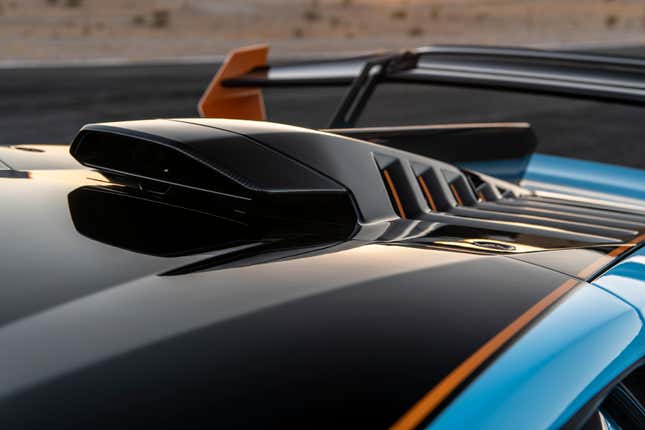
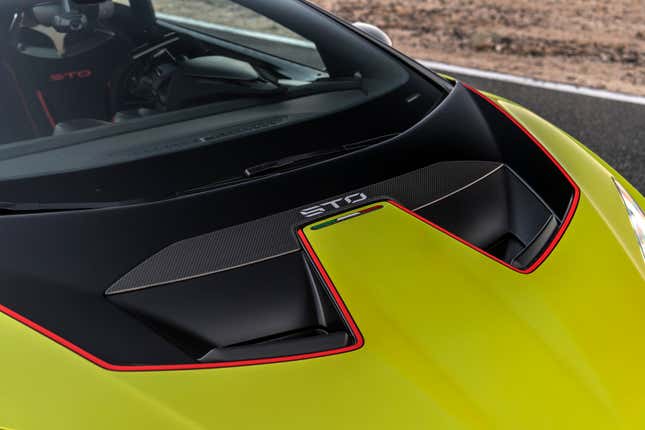
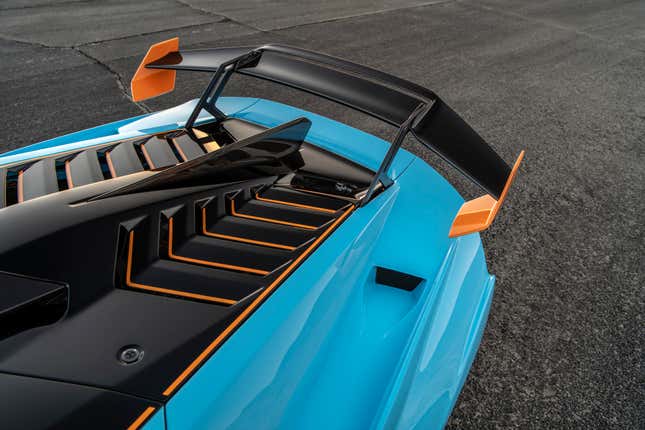
Nestled underneath all that new bodywork is Lamborghini’s tried-and-true 5.2-liter V-10. Very little has changed here, but again, it really didn’t need to. Light it up and ten angry hammers pound away frenetically behind you at idle. A mere blip of the throttle reveals the motor’s impatience at such a juvenile act; why stand still when you could be in motion?
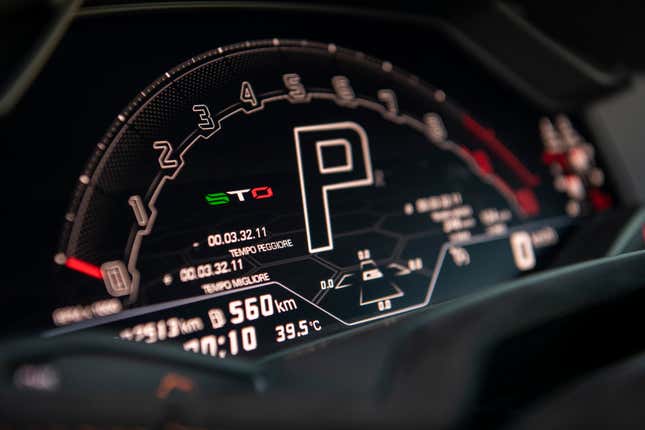
Pulling the shift paddle to engage the transmission and burying the throttle trade that impatience for a wicked enthusiasm as the STO catapults forward. Want more glorious noise to go with that thrust? A violent, gleeful shriek announces the arrival of 8,000 rpm and unlocking all 640 horsepower. 60 mph arrives in a hair under 3 seconds, but really, who cares? Those kinds of launches are best left to Tesla fanboys nowadays.
No, the brilliance of the STO lies in what the car is capable of beyond achieving straight-line speed. The ferocity of its powertrain is balanced by the utter composure of its chassis. Though the STO might be down on tech compared to the Performante, it’s not without its own tricks. The rear-wheel steering uses realtime adjustment of toe and camber angles to change the wheel alignment on the fly, while the torque-vectoring system simulates the setup of a differential preload for a quicker exit through corners. An increased track and stiffer bushings on the STO work in conjunction with the magnetic dampers to deliver a planted feel even at the limit. Lamborghini even includes an on-board telemetry system so I can download and analyze my laps.
Diving into the first turn at Willow Springs reveals unholy levels of grip provided by the new Bridgestone Potenza Race tires. Developed specifically for the STO, the Bridgestones prove to be as tenacious on the tenth lap as they do on the first, underscoring the STO’s endurance focus. Same goes for the brakes: the Brembo CC-R discs are hardy little platters, hauling down the STO lap after lap without a hint of fade. And as I continue to circle the track, I feel like I could do this all day, gas card willing.
Amidst this potently capable package, the only glaring letdown is a lackadaisical transmission when left to its own devices. You have a better chance at waking up your teenager on the weekend before noon than convince the gearbox to kick down with a nudge of the throttle. Thankfully, this only occurs in the mildest of the STO’s three drive modes, unfortunately named STO. Obviously, the solution is to employ the track-ready Trofeo mode and use the shift paddles, but this sort of shifting recalcitrance is a surprising oversight given the emphasis on quick reflexes.
But perhaps that’s Lamborghini’s subtle way of ensuring that STO owners make proper use of this stupendously capable machine. The starting price of $331,533 hasn’t been a deterrent, as the waiting list is over a year long. Might I make a suggestion to those patient buyers? Spend the year honing your track skills. Because once you take delivery of an STO, it’s the only place you’ll want to be.

